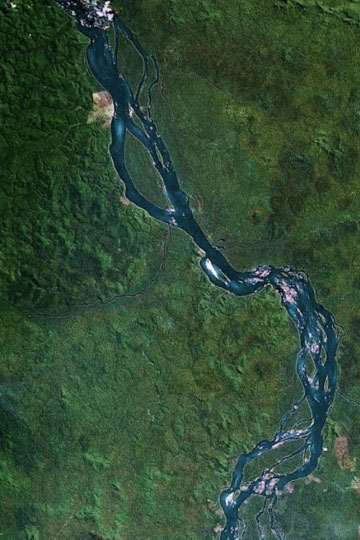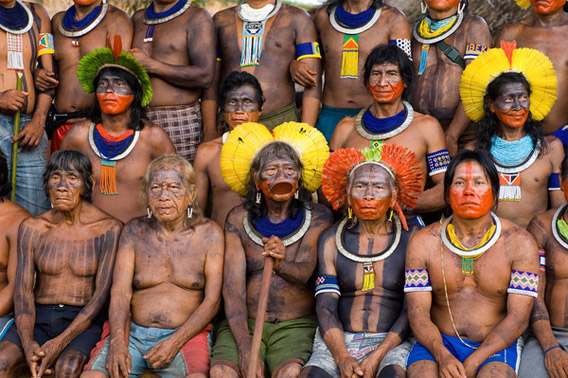So from Mongabay.com via Scission to you.
Environmental protection agency chief: Brazil will do the same to indigenous as 'Australians did to the Aborigines'
Curt Trennepohl, president of Brazil's environmental protection agency (IBAMA), caused an uproar last week when he told an Australian TV crew that his agency's role "is not caring for the environment, but to minimize the impact". Later when Trennepohl believed the cameras were off he went on to say Brazilian indigenous tribes would suffer the same fate as Australia's Aborigines, reports Folha de S.Paulo
Trennepohl made the remarks while speaking with Allison Langdon of the Australia's "60 Minutes" about the controversial Belo Monte dam, which was approved by Trennepohl despite widespread protests from environmentalists and indigenous groups. Trennepohl's predecessor resigned instead of signing the license allowing Belo Monte to proceed.
 A section of the Xingu River as viewed by Google Earth. Belo Monte is backed by Brazilian government energy companies; Vale, mining giant; Bertin, one of the largest meat processing firms; and nearly a dozen other companies. The vast majority of Belo Monte's funding comes from the Brazilian Development Bank (BNDES). |
Langdon asked Trennepohl whether he was comfortable with the decision to proceed with Belo Monte.
"Yes, the decision was mine," said Trennepohl.
"But their work is not caring for the environment?"
"No, my job is to minimize the impacts."
Trennepohl, unaware that his microphone was still live, then proceeded to imply that Brazil does not respect its indigenous population.
"You have the natives there and do not respect them," he said to Langdon.
"So you going to do with the Indians the same as we did with the Aborigines?" she asked.
"Yes, yes," said Trennepohl.
Throughout the 19th century Australian colonists ran a campaign to exterminate the Aborigines, the original inhabitants of Australia. Settlers paid bounties to trackers who captured and killed Aborigines. Discriminatory policies against the Aborigines continued into the mid-20th century and today the Aborigines as a group are among the poorest and least educated of any Australians. The United States has a similar legacy with its native peoples.

Meeting of Kayapo leaders. Earlier this month the Kayapo tribe, which will be affected by Belo Monte, established a $8 million fund to develop sustainable economic activities in their territories. © Cristina Mittermeier/ International League of Conservation Photographers (iCLP).
Trennepohl's remarks play into popular sentiment in some parts of Brazil where a common question is 'Why do so few Indians need so much land?' referring to the large extent of land demarcated as indigenous territories, including 22 percent of the Brazilian Amazon.
Roberto Malvezzi, adviser to the Pastoral Land Commission, which advocates for land reform, says that at least Trennepohl's comments are honest.
"Finally someone in power is honest with their statements," he wrote.
"The statement is a horror, a proclamation of genocide," he continued. "However, it is what is before our eyes every day. IBAMA's task is to try to put new patches on old cloth, that is, to minimize the damage done by the great works, whether official or private initiative. Prevention and precaution are not part of the government script."
Trennepohl later distanced himself from the 60 Minutes interview saying that the journalist was "very aggressive", according to Folha. The newspaper said Trennepohl would not comment on the remarks comparing Brazilian tribes and Aborigines.

No comments:
Post a Comment